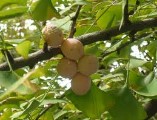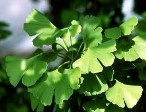Maidenhair tree, Ginkgo Biloba



This tree needs at least one male tree for every 5-7 female trees to produce nuts.
The seed can be eaten cooked. A soft and oily texture, the seed has a sweet flavour and tastes somewhat like a large pine nut. The baked seed makes very pleasant eating, it has a taste rather like a cross between potatoes and sweet chestnuts. The seed can be boiled and used in soups, porridges etc.
The seed is rich in niacin. It is a good source of starch and protein, but is low in fats. These fats are mostly unsaturated or monounsaturated.
An edible oil is obtained from the seed.
Ginkgo has a long history of medicinal use in traditional Chinese medicine, where the seed is most commonly used. Recent research into the plant has discovered a range of medicinally active compounds in the leaves and this has excited a lot of interest in the health-promoting potential of the plant. The leaves stimulate the blood circulation and have a tonic effect on the brain, reducing lethargy, improving memory and giving an improved sense of well-being. They have also been shown to be effective in improving peripheral arterial circulation and in treating hearing disorders such as tinnitus where these result from poor circulation or damage by free radicals.
The leaves contain ginkgolides, these are compounds that are unknown in any other plant species. Ginkgolides inhibit allergic responses and so are of use in treating disorders such as asthma. Eye disorders and senility have also responded to treatment.
The leaves are best harvested in the late summer or early autumn just before they begin to change colour. They are dried for later use.
The fruit is antibacterial, antifungal, astringent, cancer, digestive, expectorant, sedative, vermifuge. The fruit is macerated in vegetable oil for 100 days and then the pulp is used in the treatment of pulmonary tuberculosis, asthma, bronchitis etc. (This report might be referring to the seed rather than the fleshy fruit). The cooked seed is antitussive, astringent and sedative. It is used in the treatment of asthma, coughs with thick phlegm and urinary incontinence.
